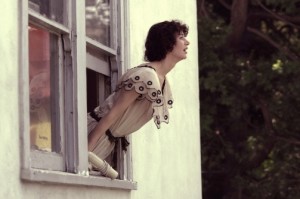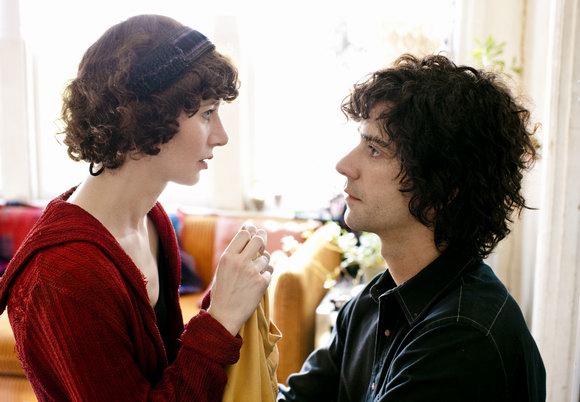Film Review: Should We Fear Miranda July’s “Future”?
The Future, director/actor Miranda July’s followup to 2005’s Me And You and Everyone We Know is brave, unexpectedly poignant, and devastatingly sad.
The Future. Directed by Miranda July. At Kendall Square and selected theaters throughout New England.
By Maraithe Thomas
What if your favorite T-shirt or blanket, the one you sleep with every night and won’t go anywhere without, followed you around like a reanimated corpse, dragging itself across the ground just to find you? And what if that T-shirt wasn’t just a T-shirt but was a representation of your soul? Well, I suppose you’d be in a Miranda July movie. Particularly, you’d be in The Future, which has not only a crawling T-shirt but a wounded feline narrator and a moon that talks; in other words, now-recognizable elements of the 37-year-old director’s work.
In the years since her debut Me and You and Everyone We Know in 2005, July has become something of a brand, say like Miracle Whip. People either love it or gag at the thought. And just like the contemporaries she is most oft-compared (i.e. Wes Anderson) people expect certain things from a new July film. These things will either send them fleeing from or flocking to the theater (the narrative kitten, “Paw Paw,” is quintessentially July). Her latest delivers by laying on the whimsy. But this time, there’s a lot more to it. The Future is brave, unexpectedly poignant, and devastatingly sad.
In the film, a duo of Los Angeles Bohemians—Sophie, a children’s dance teacher, and Jason, a work-from-home, tech support guy (played by July and Hamish Linklater)—commit to adopt that stray cat Paw-Paw, who is recovering from a wounded . . . wait for it . . . paw. Realizing they have but a month until adoption day, a.k.a. the end of their freedom, they have a hyperbolic, thirtysomething crisis and decide to live their last month to the max—“and then we can do whatever we want with the rest of our lives.” The absurdity and drama of this moment is not lost on the audience, or July for that matter.
So they quit their jobs, disconnect their Internet, and plunge into their final month. And they really go all out, as far as they know how: Jason gets a job as one of those global warming solicitors, Sophie sets out to make a expressive series of YouTube dance videos. As ridiculous as it sounds, these are the things they decide will add meaning to their lives. Jason begins spending time with an elderly man who he met after seeing an ad for a $3 hairdryer in the PennySaver (this is actually how July found the actor who played him). The man may represent, in a bit of heavy-handed symbolism, Jason in the future. The quirky self-explorations are all good-natured and fine yet obviously are set to fail on an adult level. Worse, Sophie begins an affair with an older man, and everything kind of falls apart. Time even stops moving, literally.
The cat is left to wait and wait. We know it’s waiting—and exactly how it feels about waiting—thanks to July’s ultimate touch of magical realism: it talks, in a mutated July voice, about the future and the waiting and the “inside and outside” (the film also plays with a day/night juxtaposition; printed on Sophie’s beloved shirt are the words “C’est la nuit”). The shots involving the cat show two massive paws, one bandaged of course, that appear throughout the film intermittently and are overtly ridiculous. But as Sophie and Jason drift apart to pursue their “real” endeavors, the adoption date comes, and the cat continues to wait.
This film, despite some of its eye roll-inducing moments, is a triumph for July, who, if she was looking for a spot among great current directors, has most certainly found it. She never promised to be anything to anyone, and the honesty displayed in her work is refreshing. She’s not generic, she surprises, and she’s added an aspect of originality and thrill to contemporary filmmaking. However, due to some cultural associations, July has become notorious for being, to put it kindly, not everyone’s cup of tea.
And just as public opinion of July is polarizing, so too will be this film. Most of the love/hate surrounding July seems to me to be about whether she is “kidding” or if she’s serious (or if she is serious ingenuously). Is she, as a New York Times feature on the director titled “Miranda July is Totally Not Kidding” (not kidding), merely the unwitting embodiment “of an aggravating boho archetype: the dreamy, young hipster whose days are filled with coffee, curios and disposable enchantments” or is she really like that?
In The Future, Sophie and Jason’s characters are clearly parodies of this type. They are the male and female versions of each other, and not just because of their matching haircuts. (But the haircuts do matter, symbolism is never too subtle with July.) Many of the opening scenes which show the couple at home are reminiscent of the merciless, Bohemian parody series “Portlandia,” which stars SNL’s Fred Armisen (whose name on the show is also Jason, just saying). The show has scenarios where a couple can’t commit to eating chicken at a restaurant until they’ve proven it’s organic, which is almost as ridiculous as a couple treating the short-term adoption of a stray cat as if they were about to have triplets. But July doesn’t just let them carry on functioning like that—she completely destroys them.
Not everyone would agree, but Sophie and Jason’s pre-crisis, understated banter was extremely pleasant to watch. Whether you feel pity, sorrow, or voyeuristic glee upon watching their fantasy world disintegrate probably depends much upon which side of the July divide you fall.
Regardless, the filmmaking is sound. The style is engaging, cute, and daring. Also worthy of note (and part of what makes the film so melancholic and lovely), the film’s soundtrack was wonderfully scored by Jon Brion (Punch-Drunk Love, Eternal Sunshine of the Spotless Mind) along with one Beach House song in particular that you’ll never be able to listen to again without thinking about July’s awkwardly pulsing hips.
Part of what makes July’s film so searing at its end are the same things that endear it to prospective viewers: the fact that they feel that they can, on the surface, relate to Sophie and Jason. “I’m awkward, too” or “What an adorable, made-for-each-other couple. But wait, maybe they aren’t that happy.” Maybe their lives aren’t happy in their simplicity. Maybe they’re empty and the future is cold and sad.
Maraithe Thomas is currently a copy editor and web producer at The New Yorker.
Tagged: American, Boho, contemporary, Film, Me and You and Everyone We Know, Miranda July


